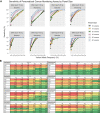Personalized Cancer Monitoring Assay for the Detection of ctDNA in Patients with Solid Tumors
- PMID: 37632661
- PMCID: PMC10590345
- DOI: 10.1007/s40291-023-00670-1
Personalized Cancer Monitoring Assay for the Detection of ctDNA in Patients with Solid Tumors
Abstract
Background: Highly sensitive molecular assays have been developed to detect plasma-based circulating tumor DNA (ctDNA), and emerging evidence suggests their clinical utility for monitoring minimal residual disease and recurrent disease, providing prognostic information, and monitoring therapy responses in patients with solid tumors. The Invitae Personalized Cancer Monitoring™ assay uses a patient-specific, tumor-informed variant signature identified through whole exome sequencing to detect ctDNA in peripheral blood of patients with solid tumors.
Methods: The assay's tumor whole exome sequencing and ctDNA detection components were analytically validated using 250 unique human specimens and nine commercial reference samples that generated 1349 whole exome sequencing and cell-free DNA (cfDNA)-derived libraries. A comparison of tumor and germline whole exome sequencing was used to identify patient-specific tumor variant signatures and generate patient-specific panels, followed by targeted next-generation sequencing of plasma-derived cfDNA using the patient-specific panels with anchored multiplex polymerase chain reaction chemistry leveraging unique molecular identifiers.
Results: Whole exome sequencing resulted in overall sensitivity of 99.8% and specificity of > 99.9%. Patient-specific panels were successfully designed for all 63 samples (100%) with ≥ 20% tumor content and 24 (80%) of 30 samples with ≥ 10% tumor content. Limit of blank studies using 30 histologically normal, formalin-fixed paraffin-embedded specimens resulted in 100% expected panel design failure. The ctDNA detection component demonstrated specificity of > 99.9% and sensitivity of 96.3% for a combination of 10 ng of cfDNA input, 0.008% allele frequency, 50 variants on the patient-specific panels, and a baseline threshold. Limit of detection ranged from 0.008% allele frequency when utilizing 60 ng of cfDNA input with 18-50 variants in the patient-specific panels (> 99.9% sensitivity) with a baseline threshold, to 0.05% allele frequency when using 10 ng of cfDNA input with an 18-variant panel with a monitoring threshold (> 99.9% sensitivity).
Conclusions: The Invitae Personalized Cancer Monitoring assay, featuring a flexible patient-specific panel design with 18-50 variants, demonstrated high sensitivity and specificity for detecting ctDNA at variant allele frequencies as low as 0.008%. This assay may support patient prognostic stratification, provide real-time data on therapy responses, and enable early detection of residual/recurrent disease.
© 2023. The Author(s).
Conflict of interest statement
All authors are stockholders of Invitae. Laura Johnson, Mike Washburn, Luke Hartje, Erik Reckase, and Verity Johnson were affiliated with Invitae at the time of the study; they are currently employees at Integrated DNA Technologies, Coralville, IA, USA. Jianhua Zhao, Jacquelyn Reuther, Kaylee Scozzaro, Megan Hawley, Emily Metzger, Matthew Emery, Ingrid Chen, Michelle Barbosa, Alijah O’Connor, Yuhua Zhang, Emily Westheimer, William O’Callaghan, Nirav Malani, Adrian Chesh, Michael Moreau, and Robert Daber are currently employees at Invitae.
Figures




Similar articles
-
Detection of circulating tumor DNA with ultradeep sequencing of plasma cell-free DNA for monitoring minimal residual disease and early detection of recurrence in early-stage lung cancer.Cancer. 2024 May 15;130(10):1758-1765. doi: 10.1002/cncr.35263. Epub 2024 Feb 29. Cancer. 2024. PMID: 38422026
-
Whole exome sequencing of cell-free DNA - A systematic review and Bayesian individual patient data meta-analysis.Cancer Treat Rev. 2020 Feb;83:101951. doi: 10.1016/j.ctrv.2019.101951. Epub 2019 Dec 13. Cancer Treat Rev. 2020. PMID: 31874446
-
Error-Corrected Deep Targeted Sequencing of Circulating Cell-Free DNA from Colorectal Cancer Patients for Sensitive Detection of Circulating Tumor DNA.Int J Mol Sci. 2024 Apr 11;25(8):4252. doi: 10.3390/ijms25084252. Int J Mol Sci. 2024. PMID: 38673836 Free PMC article.
-
Improved tumor-type informed compared to tumor-informed mutation tracking for ctDNA detection and microscopic residual disease assessment in epithelial ovarian cancer.J Exp Clin Cancer Res. 2025 Jun 12;44(1):174. doi: 10.1186/s13046-025-03433-4. J Exp Clin Cancer Res. 2025. PMID: 40506726 Free PMC article.
-
Strategies for improving detection of circulating tumor DNA using next generation sequencing.Cancer Treat Rev. 2023 Sep;119:102595. doi: 10.1016/j.ctrv.2023.102595. Epub 2023 Jun 25. Cancer Treat Rev. 2023. PMID: 37390697 Review.
Cited by
-
Optimizing ctDNA: An Updated Review of a Promising Clinical Tool for the Management of Uveal Melanoma.Cancers (Basel). 2024 Sep 1;16(17):3053. doi: 10.3390/cancers16173053. Cancers (Basel). 2024. PMID: 39272911 Free PMC article. Review.
-
Ultrasensitive ctDNA detection for preoperative disease stratification in early-stage lung adenocarcinoma.Nat Med. 2025 Jan;31(1):70-76. doi: 10.1038/s41591-024-03216-y. Epub 2025 Jan 13. Nat Med. 2025. PMID: 39806071 Free PMC article.
-
Decoding the Dynamics of Circulating Tumor DNA in Liquid Biopsies.Cancers (Basel). 2024 Jul 1;16(13):2432. doi: 10.3390/cancers16132432. Cancers (Basel). 2024. PMID: 39001494 Free PMC article. Review.
-
Pretreatment and on-treatment ctDNA and tissue biomarkers predict recurrence in patients with stage IIIB-D/IV melanoma treated with adjuvant immunotherapy: CheckMate 915.J Immunother Cancer. 2025 Jul 11;13(7):e012034. doi: 10.1136/jitc-2025-012034. J Immunother Cancer. 2025. PMID: 40645660 Free PMC article. Clinical Trial.
-
Minimal residue disease detection in early-stage breast cancer: a review.Mol Biol Rep. 2025 Jan 7;52(1):106. doi: 10.1007/s11033-024-10198-0. Mol Biol Rep. 2025. PMID: 39777588 Review.
References
-
- Chaudhuri AA, Chabon JJ, Lovejoy AF, et al. Early detection of molecular residual disease in localized lung cancer by circulating tumor DNA profiling. Cancer Discov. 2017;7:1394–1403. doi: 10.1158/2159-8290.CD-17-0716. - DOI - PMC - PubMed
Publication types
MeSH terms
Substances
LinkOut - more resources
Full Text Sources
Medical

